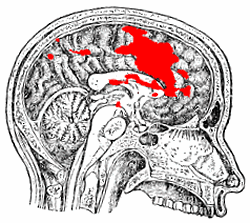 I was interested to see reports here and there the other day that scientists had discovered the seat of the will in the anterior midcingulate cortex.
I was interested to see reports here and there the other day that scientists had discovered the seat of the will in the anterior midcingulate cortex.
That’s not precisely the case, of course; there’s an article here which describes the research. The scientists in question had an unusual opportunity to use electrodes in the brains of two patients; although they did indeed operate in the anterior midcingulate cortex they believe they were stimulating the brain’s salience network, which is quite widely distributed. The effect was apparently to create feelings of needing to persist against challenging circumstances; the researchers themselves call it “the will to persevere”. The patients were fully conscious and able to describe their feelings, but alas no tests were carried out to see whether they were in fact more persistent when stimulated.
The correct interpretation of the results seems difficult to me. As I understand it, the theory of the salience network holds that brain activity is controlled by neural networks which stretch across several regions of the brain. The default mode network, or DMN, is the one that operates when we’re not focused on anything in particular, perhaps daydreaming. It has been suggested that loss of this function is what distinguishes people who have “locked-in” syndrome from those who are in a “persistent vegetative state” – if you lose your DMN you’re not really there any more, in other words.
When we concentrate on a task, another network takes over – the central executive network, or CEN. The role of the salience network, if I’ve got this right, is primarily to act as arbitrator between the two. It spots something that deserves attention – something salient, indeed – and switches control from DMN to CEN. That’s fine, but it doesn’t seem to have much to do with persistence; it’s actually about changing the object of attention, not sticking with it. But perhaps strong or continuing stimulation of the salience network has that kind of effect. The salience network says “you need to look at this”, so perhaps when it operates emphatically we think “yes, I’m going to look the hell out of that alright; I’m going to look at that intensively; when I’ve finished looking at that, by golly it’s going to stay looked at”.
More plausibly it might all be to do with physiological effects; besides directing attention the salience network has a role in gearing up our “fight or flight” state, and it might just be that in that state we feel ready for a challenge ( in which case a readiness to persist comes into it, but surely isn’t the whole point); that would be a William James style emotion, originally a matter of the gut more than the mind.
Anyway, this really has nothing to do with an organ of the will. That is an interesting notion, though, isn’t it? My own assumption is that the will emerges from the operation of general cognition and that there couldn’t be a separate will module. If such a module determined the actions to be willed, it would surely have to encompass almost the whole of cognition, and so be far more than just a module; if it merely willed the actions selected for it by the rest of the brain it wouldn’t amount to much at all.
People do, of course, often hypothesise that there might be a special function for assigning value, or flagging up those things we ought to pursue as desirable. To me, though, that seems a bit different; the will, properly understood, is not a matter of basic motivation, but a faculty which might over-ride that motivation, either by operating at a meta level or simply by acting as a restraining and countervailing force.
Would that even be a distinct faculty of its own? Some would probably question whether talking about the will is a useful approach at all, rather than a relic from outmoded ideas about the soul controlling the body through acts of will. I must admit I find it hard to think of any subject that can’t be adequately discussed without mentioning the will. Even free will doesn’t really lose anything if we talk about free action. So is the will even worth persisting with? I can feel my DMN kicking in…
 A bit of a tribute to three people who have persisted in the face of scepticism.
A bit of a tribute to three people who have persisted in the face of scepticism.
